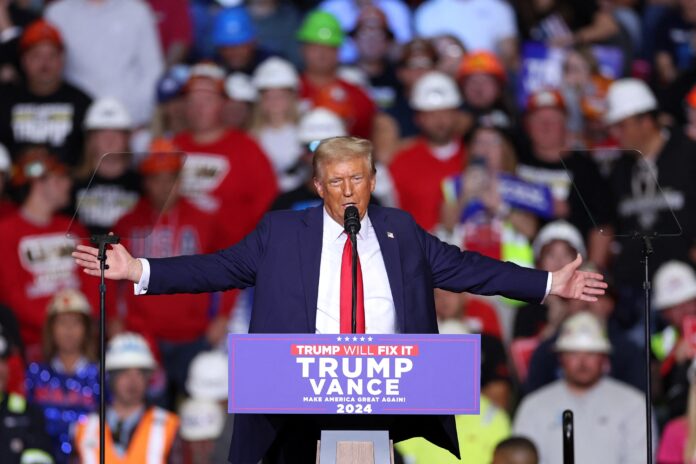In a surprising twist in American history, Donald J. Trump has returned to the White House as the 47th president of the United States, reclaiming leadership after a four-year hiatus. At age 78, he not only became the oldest sitting president, surpassing the record previously held by Joe Biden but also staged a historic political comeback after a contentious exit in 2020.
During his populist campaign, Trump pledged to take strong action on immigration. He played on the fears of immigrants and economic worries to defeat Vice President Harris. Back in 2015, he vowed to carry out a mass deportation of over 13 million undocumented immigrants residing in the country. Throughout his recent election movement, he emphasized that he would not compromise on economic priorities and enforce strict immigration policies, including new measures to prevent migrants from entering the U.S.
“We’re going to help our country heal,” Trump said. “Our country needs help, and it needs it urgently. We’re going to secure our borders, we’re going to fix every part of our country, and we made history tonight for a reason, and that reason will be fulfilled.”
However, Trump’s victory against Vice President Kamala Harris reflects a nation deeply split on key issues. Polls leading up to the election revealed a stark divide, especially across gender lines. His support from male voters, including a growing base of younger men, proved pivotal in contrast to the heart of Harris’s campaign, which found strong backing among women.
This victory marks the second time Trump has triumphed over a female opponent vying to break the highest glass ceiling in U.S. politics. The 2024 election showcased many Americans’ concerns about the economy, immigration, and government transparency, issues that Trump tapped into effectively to secure his return to the presidency.
However, Trump’s return has sparked concern among many who worry about his views on democracy and the rule of law. His administration begins amid unresolved questions about his involvement in attempts to overturn the last election, which adds a complex layer to his leadership. While some supporters view his victory as a step toward a stronger America, others fear it could be a setback for democratic principles and civil rights.
The future of abortion rights in America is one of the biggest questions hanging over Trump’s second presidency. With the conservative-leaning Supreme Court already shifting abortion laws, activists and citizens are watching to see if Trump’s administration will push for further restrictions. Around 63% of Americans now face limits on abortion access, with more policies likely under review.
Furthermore, Trump’s foreign policy of “America First” is expected to continue shaping U.S. relations around the world. His promises to reduce U.S. involvement in international conflicts and focus on national interests could lead to significant shifts, especially in the Middle East. His stance on the Gaza conflict, in particular, is closely aligned with Israeli interests, suggesting a U.S. foreign policy heavily supportive of Israel. As Trump backs an end to the Gaza War on Israel’s terms, concerns rise about the impact on Palestinian civilians and the broader stability of the region.
On the economic front, Trump’s policies toward China are under scrutiny. He previously imposed tariffs on $300 billion in Chinese goods, and now suggests even stricter measures, with tariffs that could exceed 60%. If he follows through, a new trade war might erupt, further straining relations between the world’s two largest economies. China, already facing economic challenges, may push back aggressively, but Trump’s unpredictable approach leaves uncertainty about future U.S.-China relations.
Notably absent from Trump’s campaign rhetoric was any mention of Pakistan or its former Prime Minister, Imran Khan, who is currently imprisoned. This silence could indicate a shift in U.S. priorities, with Pakistan potentially playing a smaller role in Trump’s foreign policy plans. This pivot may impact Pakistan’s relationship with the U.S., as Trump seems more focused on China, the Middle East, and pressing domestic issues.
As Trump settles into his second term, his policies will likely emphasize national interests and a return to some of his earlier approaches, but with even more dramatic shifts in key areas like foreign relations, trade, and domestic policy. With a divided country and a world watching closely, Trump’s presidency promises to be a defining chapter in American history.




